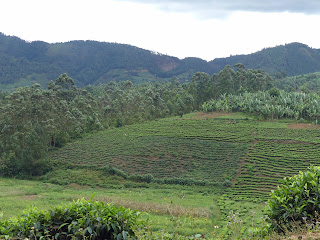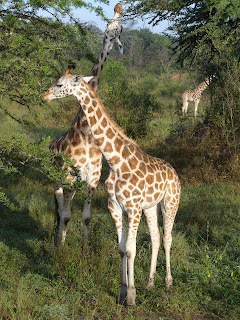30th January - Ishasha to Mutanda Lake
 |
| Our tent |
After we had
woken up, we sat outside our tent and enjoyed watching the river running by
us. Quite soon, we spotted Henry, the
resident lone male hippo, wandering along the river edge and then he
disappeared off into the bush. After
breakfast, we were told about a lone elephant standing in the river feeding off
some trees on the island so duly went to admire her/him. There were lots more stunning butterflies to
admire too and I also got attacked again by the very vicious fire ants.
 |
| A herd of topi that we passed leaving Ishasha |
We then
heard that our vehicle hadn’t been repaired so that another driver and vehicle
would be arriving at some point to do the next transfer. We had to hang around for another couple of
hours and eventually Vincent turned up in a much smaller, and, as it transpired,
rather uncomfortable Land Cruiser. He
wasn’t a guide, so just drove as fast as he could ignoring anything of
interest. We were frustrated as were
assured Ishasha was a great place for the pin tailed Wydah bird and although we
got fleeting glances of them, Vincent just shot by them all.
 It was
actually a very long and tiring journey.
We left at 11am and eventually arrived at Chameleon lodge at about 5pm,
so a good 6 hours. The roads were some
of the worst we’d some across so far which meant we were really shaken around
too which didn’t help. However, the
scenery became very spectacular as we climbed into the mountains with amazing
views which we could have photographed if Vincent had stopped at all. He did stop a couple of times for a loo break
for himself, but to be fair to him, we declined loo breaks for us. There didn’t look to be anywhere suitable to
stop at and there was no way you could go for a quiet pee in the bush as there
were always people around.
It was
actually a very long and tiring journey.
We left at 11am and eventually arrived at Chameleon lodge at about 5pm,
so a good 6 hours. The roads were some
of the worst we’d some across so far which meant we were really shaken around
too which didn’t help. However, the
scenery became very spectacular as we climbed into the mountains with amazing
views which we could have photographed if Vincent had stopped at all. He did stop a couple of times for a loo break
for himself, but to be fair to him, we declined loo breaks for us. There didn’t look to be anywhere suitable to
stop at and there was no way you could go for a quiet pee in the bush as there
were always people around.
We did make
one stop at a view point where a young lad came to stand by me and asked “have
you farted”, which was an interesting way to start a conversation!! I declined to comment.
 |
| Lake Mutanda - view from our room |
We
eventually arrived at Lake Mutanda which is one of a series of very beautiful
crater lakes on the Rwanda/DR of Congo border.
Our lodge was the opposite side of the lake so we had to endure anther
30 minutes of being shaken around before we finally arrived at the lodge. It’s very individual and different. The main area is a series of brightly
coloured towers which opens up into a large dining area and sitting room. Outside is a fabulous deck with jaw dropping
views over the lake with 3 large volcanoes behind, which you can see if the
cloud clears. The lodge is built on a
hill side and there are 10 cottages down the hill all brightly coloured set in
their own private gardens. Of course, we‘re down at the bottom, but at least it’s very quiet down here being the end of
the line.
 |
| The main entrance |
Our cottage
is painted grey, but inside has purple walls, red curtains and a bright yellow
door into the bathroom. It sounds odd,
but kinda works. Electricity is only
available between 6.30pm until 10pm and then from 5am to 10am. Hot water is available all the time in the
shower only. We’re quite happy with
that. If you want the internet, then
like a lot of places, it’s only available in the public areas in the main
lodge.
This place
is used as a base by a lot of people doing the gorilla trekking. We’ve spoken to a couple of different parties
and it seemed it varies enormously as to how far you have to trek. Yesterday’s lot had to walk 3.5 hours before
finding gorillas and came back pretty muddy.
Today’s lot only had to walk for an hour 1st before finding 14 and
having a really great experience - they weren’t so muddy, but got rained on and
said there was a lot of uphill at the end.
We had a
most enjoyable drink on the decking in the evening followed by a great
dinner. We were then directed to go
outside where we could just make out a red glow on the horizon, which is
apparently an active volcano in the DR of Congo - the last of the 7 volcanoes
in the chain where we are seeing the 1st 3 which are all extinct.



Comments
Post a Comment